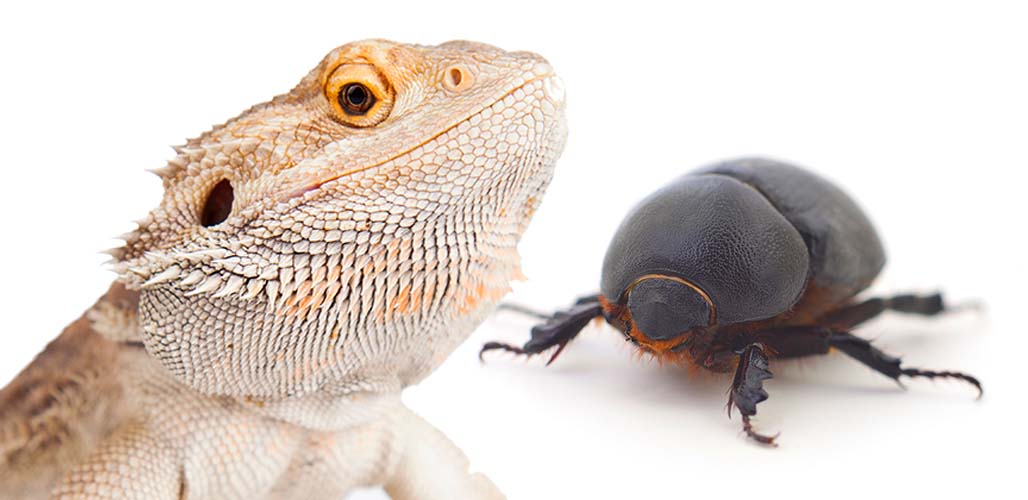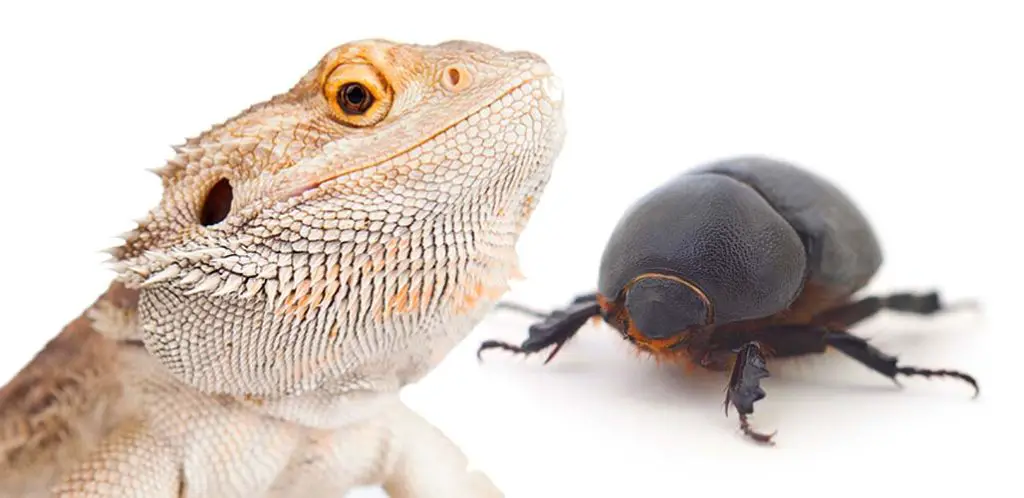Bearded dragons are known for their voracious appetite and will eat almost anything presented to them. However, as responsible pet owners, it’s important to ensure that their diet is well-balanced and appropriate for their health. One question that often arises is whether bearded dragons can eat darkling beetles.
Darkling beetles are a common food source for many reptiles, but are they safe for bearded dragons to consume? In this article, we’ll explore the nutritional value of darkling beetles, the potential risks associated with feeding them to bearded dragons, and what other alternative foods could be better suited for their diet.

Can Bearded Dragons Eat Darkling Beetles?
Bearded dragons are omnivorous creatures, which means they can eat both plant and animal materials. They have a voracious appetite and often consume insects as part of their diet. However, not all insects are safe for bearded dragons to consume. This article will explore whether bearded dragons can eat darkling beetles and if it is safe for them to do so.
What are darkling beetles?
Darkling beetles belong to the family Tenebrionidae, which includes over 20,000 species. They are found all over the world and can be recognized by their dark coloration and hard exoskeleton. Darkling beetles are often used as feeders for reptiles and other exotic pets, but are they safe for bearded dragons to eat?
Darkling beetles are not toxic to bearded dragons, but they do have a tough exoskeleton that can be difficult for them to digest. If a bearded dragon consumes too many darkling beetles, it can lead to impaction, a condition where the digestive tract becomes blocked with indigestible material. This can cause serious health problems and even death if left untreated.
The benefits of feeding darkling beetles
Despite the risk of impaction, darkling beetles can be a nutritious addition to a bearded dragon’s diet. They are high in protein, which is essential for healthy muscle growth and maintenance. They also contain vitamins and minerals that are important for overall health, such as calcium, phosphorus, and vitamin B12.
To ensure that your bearded dragon can safely digest darkling beetles, it is important to offer them in moderation. You should also make sure that the beetles are gut-loaded, meaning that they have been fed a nutritious diet before being offered to your pet. This will ensure that your bearded dragon is getting the most nutritional value from the beetles.
The risks of feeding darkling beetles
As mentioned earlier, the biggest risk of feeding darkling beetles to your bearded dragon is impaction. This can happen if your pet consumes too many beetles at once or if they are not properly chewed before swallowing. Darkling beetles also have a hard exoskeleton that can cause intestinal damage if not properly digested.
Another risk of feeding darkling beetles is the potential for parasites. If the beetles are not properly sourced or stored, they may contain harmful organisms that can be passed on to your bearded dragon. This can lead to serious health problems and even death if not treated promptly.
Alternatives to darkling beetles
If you are concerned about the risks associated with feeding darkling beetles to your bearded dragon, there are plenty of safe alternatives available. Some of the best insect options for bearded dragons include crickets, mealworms, and dubia roaches. These insects are easier to digest and are less likely to cause impaction.
It is also important to offer your bearded dragon a variety of fruits and vegetables as part of their diet. This will ensure that they are getting all of the essential vitamins and minerals they need to stay healthy. Some good options include leafy greens, squash, and berries.
Conclusion
In conclusion, bearded dragons can eat darkling beetles, but it is important to do so in moderation. Darkling beetles are high in protein and other essential nutrients, but they also have a hard exoskeleton that can be difficult for bearded dragons to digest. If you choose to feed your bearded dragon darkling beetles, make sure to offer them in moderation and ensure they are properly gut-loaded. Alternatively, you can offer safer insect options such as crickets or dubia roaches.
Frequently Asked Questions
Can Bearded Dragons Eat Darkling Beetles?
Yes, bearded dragons can eat darkling beetles. These insects are a good source of protein and other nutrients that can benefit your pet’s health. However, it is important to remember that darkling beetles should not make up the majority of your bearded dragon’s diet. They should be fed as part of a varied and balanced diet that includes other insects, vegetables, and fruits.
It is also important to make sure that the darkling beetles you feed your bearded dragon are free from pesticides and other harmful chemicals. You can either raise your own darkling beetles or purchase them from a reputable supplier. When feeding your bearded dragon darkling beetles, make sure they are of an appropriate size. Young bearded dragons should be fed smaller beetles, while adults can handle larger ones. Overall, darkling beetles can be a healthy addition to your pet’s diet when fed in moderation.
Are Darkling Beetles Safe for Bearded Dragons to Eat?
Yes, darkling beetles are safe for bearded dragons to eat as long as they are fed in moderation and are free from harmful chemicals. These insects are a good source of protein and other nutrients that can benefit your pet’s health. However, it is important to remember that bearded dragons should be fed a varied and balanced diet that includes other insects, vegetables, and fruits.
Darkling beetles should not be the sole source of food for your bearded dragon. Feeding your pet a diet that is too high in protein can lead to health problems such as gout and kidney disease. When feeding your bearded dragon darkling beetles, make sure they are of an appropriate size. Young bearded dragons should be fed smaller beetles, while adults can handle larger ones. Overall, darkling beetles can be a healthy addition to your pet’s diet when fed in moderation.
Feeding juvenile bearded dragon – darkling beetle sp.
In conclusion, bearded dragons can eat darkling beetles, but it is not recommended as a staple part of their diet. While these insects are high in protein and can provide some nutritional benefits, they also contain a substance called oxalic acid that can bind to calcium and prevent its absorption. This can lead to metabolic bone disease, which can be very harmful to your bearded dragon’s health.
It’s important to remember that a varied diet is essential for your bearded dragon’s overall health and wellbeing. While darkling beetles may be a fun treat for your pet, they should not make up a significant portion of their diet. Instead, try offering a variety of vegetables, fruits, and other insects that are known to be safe and nutritious for bearded dragons.
In the end, the decision of whether or not to feed your bearded dragon darkling beetles is up to you. But by keeping in mind the potential risks and benefits, you can make an informed decision that will help keep your pet healthy and happy for years to come.


